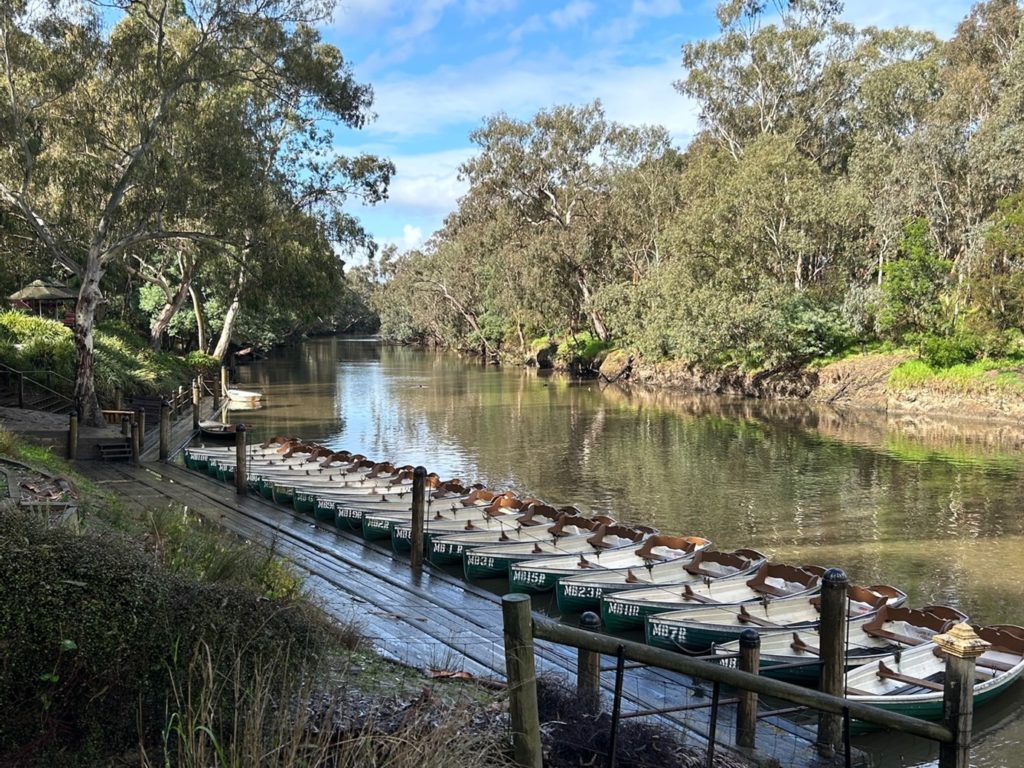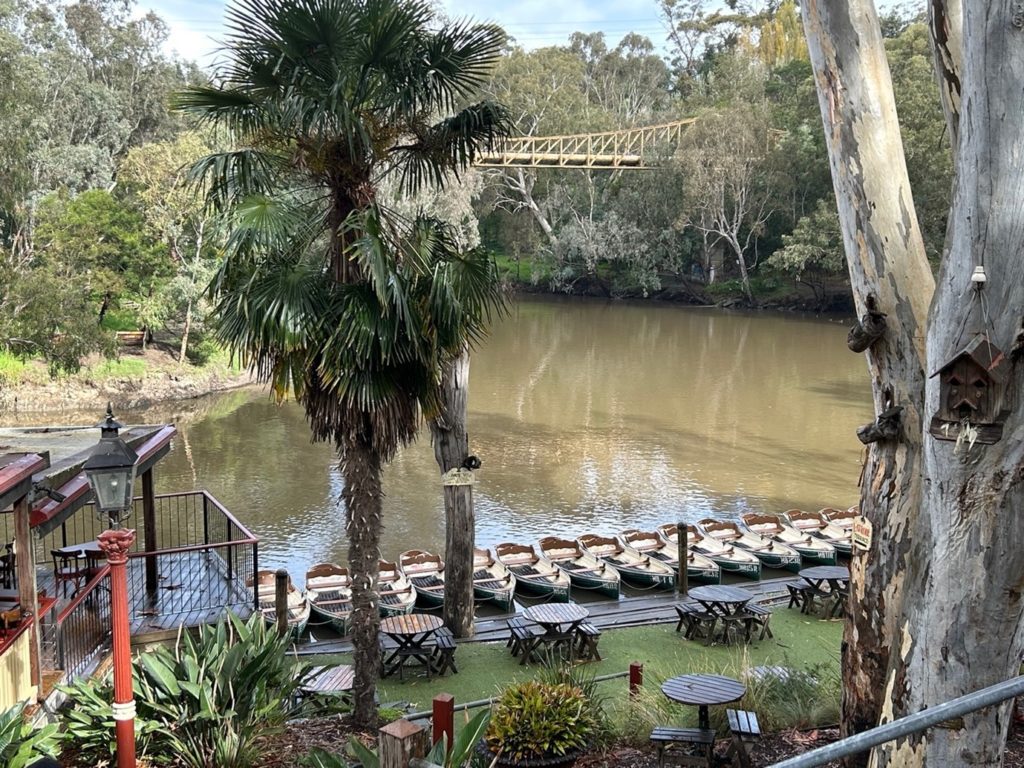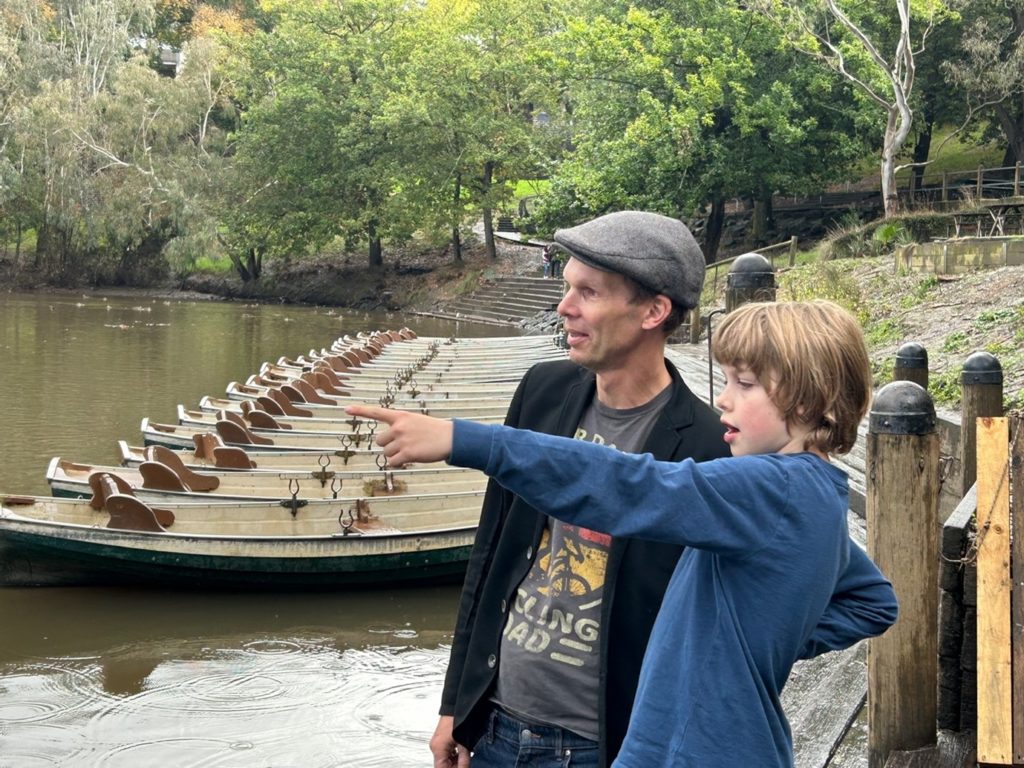




, By Yarra
The iconic Fairfield Park Boathouse and Tea Gardens is just seven kilometres from Melbourne’s CBD. It’s a blustery afternoon as I plod downhill to this little-known treasure on the banks of the Birrarung not far from Dight’s Falls.
The place appears deserted until I spot a handful of visitors enjoying coffee and cake. They’re huddled behind plastic blinds protected from the strong wind and occasional rain shower.
As I wait for Rob Moorman and his son Mobius (Mobi) to arrive, I stroll around the boathouse taking photos and reading up on its intriguing history.
Built in 1908 by piano tuner John St Clair, the boathouse was once a thriving hub for family gatherings and boating parties. By the 1980s, however, it was declared unfit for human habitation and closed until the Van Der Sluys family restored it in 1985.
Wandering down to the jetty, I look back at the boathouse and imagine it over-flowing with happy river-loving humans in the height of summer.

Fairfield Boathouse and Tea Gardens as it is today. Photo by Carolyn Tate.
A string of empty rowboats bob gently on the beautiful brown Birrarung. They’re ready for hire but it’s not likely there’ll be much custom today given the windy weather.

Boats on the Birrarung at Fairfield Boathouse. Photo by Carolyn Tate.
Rob and Mobi arrive on their bikes, and from the smiles on their faces, I sense their excitement at the prospect of sharing their Birrarung love stories. At the quaint tearoom counter, we order coffees and a thick-shake before finding a cosy corner table for our interview.
Suddenly there’s a little ray of sunshine peeking through the grey clouds. We make haste to the jetty for some father and son shots before we lose the moment.

Father and son, Rob and Mobi Moorman on the Fairfield Jetty. Photo by Carolyn Tate.
Returning to the tearooms, we get comfortable and begin our conversation.
Rob is a digital storyteller, the owner of Hunting with Pixels and a musician who was born in the Netherlands. In 1970, at the age of three, his dad (a geologist) packed their family of five onto a boat to South Africa. From there they drove a Corolla 3000 kilometres to the Congo.
‘Many of our geologist friends were amazed that we managed to get there without a 4WD. Years later we drove back in that same Corolla and returned to the Netherlands,’ says Rob.
‘I can remember being struck by the amount of walking people had to do to fetch water. Every time I turn on a tap, I think what a luxury it is to never have to think about access to water and I’m thankful for the Birrarung.’ (Note: The Birrarung supplies 70% of Melbourne’s drinking water.)
Rob and his wife Beth lived in London then Sydney before moving to Melbourne in 2013. Mobi was just one at the time.
‘We moved here because of the river and Melbourne’s culture. We were struggling socially in Sydney, then one day I was in Melbourne filming for a client right here at this boathouse. I watched people kayaking, mountain biking and hiking in the heart of the city and I got a sense of the quirkiness of Melbournite’s and the diverse culture. I knew this place would become home that day.’
It’s a fitting moment to pause and take in our surrounds as a flock of chattering rainbow lorikeets land in the swaying branches of a gum tree just feet away.

View from the balcony capturing the original Fairfield Pipe Bridge built in 1878 to carry water from the Yan Yean Reservoir to Kew. Photo by Carolyn Tate.
‘Our lives are mostly spent in sterile temperature-controlled environments on screens. I try to escape that as much as I can. Wherever I go, I always look for connection to the land and water. It’s very grounding and it gives me a sense of place and belonging,’ says Rob.
Mobi has been listening intently to his dad’s story. At 11 years of age and in Year 5 at Spensley Street School in Clifton Hill, he comes across as a wise and thoughtful young soul.
‘I love things like computers and video-game design and nature experiences like mountain biking and canoeing with dad to clean up the river,’ he responds when I ask him about his interests.
A Kookaburra lands on the rail just three feet away. One eye is on us and the other is on the hot chips with sauce that have just arrived. We attempt to shoo it away but it won’t budge. Shuffling to the end of the table we return to our conversation.

Rob and Mobi remembering the day they decided to start doing river clean-ups by canoe.
Mobi was just four when he and his dad began cleaning up the Birrarung in 2015.
‘I was standing with Dad by the river and I saw about five plastic bottles floating past. It made me sad and I wanted to do something about it. Dad remembers I said… ‘let’s clean up the world!’’
ay after heavy rains and the river was littered with plastic bottles and rubbish. Even at four years old he understood the tragedy of it,’ says Rob. It reminds me of my own experience at seeing the plastic litter at Deep Rock and Dight’s Falls after the 2022 floods.
That moment become a catalyst for action for the father and son. Rob bought a canoe, paddles and life-jackets and the very next day they were on the river collecting rubbish. They began doing clean-ups once a month but loved it so much it became a weekly adventure.
‘In the early days we got laughed at. People would point at us and yell out, ‘What are you doing?’ A few years in, people started thanking us and telling us we were inspiring. Then we started noticing other people doing it too. There’s been a shift in people’s attitudes. It’s not strange to pick up rubbish anymore.’
‘People don’t realise the consequences of not putting their rubbish in a bin. They think others will take care of it and it’s not their responsibility. But we’re all responsible. If it’s not in the bin it’s likely to end up in the river,’ says Rob.
Over the years, the pair have found plastic bottles, spray cans, dog poo bags, a chair, tyres, Lime Bike helmets and even a car wheel and ladder.
‘We’ve collected somewhere between 300 and 400 dog balls too,’ says Mobi. ‘Some of them we had to throw out but we’ve cleaned a lot of them up to give back to people. Once we put them on the curb with a sign for neighbours to grab.’
‘We need to educate people not to throw balls in the river to their dogs, only sticks,’ he says.
Rob and Mobi often make a game of their clean-ups. Whoever finds the most bottles in half an hour wins. Or they use a point system: one point for a bottle, two points for a dog ball and five points for something weird like a ladder.
‘By gamifying it, we make it fun even though it’s sad that it needs to be done,’ says Mobi.
Mobi wants to encourage other kids and their parents to get involved. Their father/son river clean-ups became the inspiration behind The Power of Five: Just do Something video. It’s a project encouraging young people to address their climate anxiety by doing something positive for the environment with five friends in their local community.
The Power of 5 is making a positive impact for young people anxious about climate-change.
‘I’m also planning on starting a game-design company—not a shooting game like Call of Duty but something good for people and the environment, perhaps something that would educate people about the river and encourage them to take care of it,’ says Mobi.
‘So, instead of playing Call of Duty kids can play Call of the River,’ I quip.
We’re nearing the end of our conversation and that Kookaburra has now flown off to an abandoned hamburger on a table nearby.
‘Any final words?’ I ask.n-ups have given us a shared purpose and a deep connection to each other. It’s been great for our relationship. Just canoeing for canoeing’s sake, is not enough. Canoeing while cleaning up the river together is the magic glue,’ says Rob. Mobi nods in agreement.
Rob continues: ‘We never know how we impact others. Thousands of people have seen us fishing out rubbish from the river. Is there a correlation between us doing it and the fact other people are now doing it? Maybe there is. Maybe not. That’s how we influence each other though, whether we know it or not.’
Love your river, support your Riverkeeper by becoming a member or with a one-off or monthly donation.
Story by Carolyn Tate
References:
More information on Rob Moorman and Hunting With Pixels
Visit the Fairfield Park Boathouse and Tea Gardens
Aerial view of Fairfield Park Boathouse and Tea Gardens
ABC The Unofficial History of Fairfield Park Boathouse and Tea Gardens Listen
Darebin Library History of Fairfield Park Boathouse Link